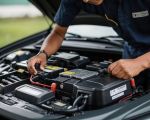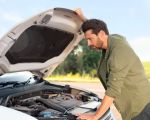What to Do When Your Car Breaks Down at Night: Essential Safety Tips
Imagine this: You're driving home after a long day, the road is dark, and the only sound is the hum of your car. Suddenly, the engine sputters, and your car rolls to a stop in the middle of nowhere. It's the kind of situation that can easily send your heart racing—especially when it's late at night. But don’t panic; here’s how you can stay safe and handle the situation with confidence.

AJ's Auto Glass & Detailing
4404 S 84th St, Omaha, NE 68127, USA
1. Stay Calm and Assess the Situation
The first and most important thing to do when your car breaks down at night is to stay calm. Panic can cloud your judgment and make the situation worse. Take a deep breath and assess where you are. Look for any visible landmarks, signs, or road numbers that could help you identify your location. If you can, pull over to the side of the road or find a safer spot to stop your vehicle.
One time, I had a breakdown on a desolate stretch of highway. My car came to a halt just as I passed a small, dimly lit gas station. I was thankful that I was able to coast into the parking lot. If that hadn’t been there, I would have been stranded in a much riskier position. Always keep your surroundings in mind and remember that your safety is the priority.

AJ's Auto Glass & Detailing
4404 S 84th St, Omaha, NE 68127, USA
2. Turn On Hazard Lights and Set Up Roadside Flares
Once you’re safely stopped, immediately turn on your hazard lights. These lights let other drivers know that you’re having trouble and that they should approach with caution. In some areas, it’s also wise to use a roadside flare or reflective triangles to make your car more visible to other drivers. Visibility is key in preventing accidents, especially at night when it's harder for other vehicles to see you.
When I was once stranded late at night on a rural road, I had no flares, and I realized how vulnerable I was. A passing car almost swerved into me, and that’s when I learned the importance of making your vehicle visible. In hindsight, I could’ve avoided that scare with better preparation, so I always keep flares in my emergency kit now.
3. Avoid Leaving Your Vehicle Unless Necessary
One of the most common mistakes people make when stranded at night is stepping out of their car. While it’s tempting to check your tire or look for help, you may be putting yourself at risk. At night, visibility is low, and other drivers might not see you until it's too late. Your car can provide you with some protection, and it’s usually safer to remain inside unless there's a pressing need to exit.
I remember one incident when my car broke down on a highway late at night. Instead of staying inside, I attempted to walk to a nearby gas station. I quickly realized that walking on the shoulder of a highway in the dark was a bad idea—especially since there was little traffic, and I felt isolated. I turned back and stayed in my car, which was the safest choice.
4. Call for Help – Roadside Assistance or Towing Service
When your car breaks down at night, calling for help is one of the best things you can do. Whether it’s a towing company, roadside assistance service, or even a friend, don’t hesitate to reach out. Many companies offer 24/7 services for situations like these, and they can help you get back on the road safely. If you don’t have roadside assistance, look up nearby tow companies or call a trusted friend or family member.
In my experience, calling for help as soon as possible is crucial. There’s no shame in needing assistance. I once had a flat tire on a dark stretch of road. Fortunately, I had a roadside assistance plan, and the tow truck arrived in less than an hour. Without that support, I would have been stuck in a potentially dangerous spot, unsure of what to do next.
5. Stay Inside the Vehicle and Lock Doors
While waiting for help, it’s important to remain inside your vehicle with the doors locked. This keeps you safe from potential threats or dangerous individuals who might be roaming the area. If you feel unsafe, don’t hesitate to call the police for assistance. It’s better to be cautious than to take unnecessary risks when you’re alone at night.
During another breakdown experience, I was parked in a poorly lit area, and I could sense that something wasn’t right. I kept the doors locked and remained alert. Just a few minutes later, a car pulled up, and I could see someone lingering near my vehicle. Thankfully, I had stayed inside, and they drove away after realizing I wasn’t leaving anytime soon.
6. Use Your Phone Wisely
In today’s world, most of us have smartphones, and they’re incredibly helpful when it comes to roadside emergencies. However, you need to use your phone wisely. Before you lose battery, make sure you've sent a message to a friend or family member about your situation and location. Use GPS to pinpoint your exact spot so that help can find you more easily.
Once, when my phone battery was low, I made sure to conserve power by sending a quick text to my friend, letting them know where I was and what was happening. I also activated the “find my phone” feature, which helped my friend locate me in case of any issues. It’s always a good idea to be proactive when it comes to communication.
7. Consider Having an Emergency Kit in Your Car
Another great way to prepare for unexpected breakdowns is by keeping an emergency kit in your car. This kit should include items like a flashlight, extra batteries, a first aid kit, a blanket, non-perishable food, water, and even a basic toolset. It’s always better to be over-prepared than under-prepared.
During one of my late-night breakdowns, I had an emergency kit that saved me from being uncomfortable while waiting for help. I was able to keep warm with a blanket, and my flashlight made it easier for the tow truck driver to see me when they arrived.
8. Stay Aware of Your Surroundings
Even though you may feel safer inside your car, it’s always a good idea to remain alert to your surroundings. Keep an eye out for other vehicles and individuals who might be nearby. If something feels off, trust your instincts. Safety should always be your top priority, especially when you're in a vulnerable situation at night.
One evening, I had the unsettling feeling that I was being watched when I was stuck on the side of the road. I immediately called the police and asked them to send someone to check on me. As it turned out, the situation wasn’t as dangerous as it seemed, but staying aware of my surroundings and calling for help kept me safe.




























